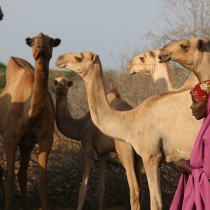ALSO IN THE NEWS

AU, Kenya seek to improve camel productivity through new drug
The African Union and Kenya are set to unveil a new camel drug to help increase productivity and improve livelihoods in the Horn of Africa market. Judith Chemuliti, Director of Kenya's Biotechnology Research Institute (BioRI) said on Thursday that once the study is complete, the drug will replace the current drug, tryquin that has been in existence for the last 20 years. "We are set to look at an integrated control of camel diseases that threaten livelihood and food security in the Horn of Africa," Chemuliti said during the project launch in Nairobi
She blamed tryquin's ineffectiveness for the spread of surra, a camel trypanosomiasis disease that is a constraint to camel production.
She blamed tryquin's ineffectiveness for the spread of surra, a camel trypanosomiasis disease that is a constraint to camel production.
Chemuliti, who is also the study's Principal Investigator, said that the study will help contribute to development of pastoral communities through sustainable intensification of pastoral livelihoods.
The scientist noted that the three-year study which will be funded by the African Union will be carried out in Somaliland in northern and northeastern Kenya.
She observed that camel production has been a significant livelihood means and an integral part of socio-cultural practices of pastoralist communities in Somalia and ecosystem in the Horn of Africa yet the disease causes high mortality, reduction in milk production and loss in body condition.
"Unlike other livestock species, camels are affected most by surra due to abundance of its unique vectors -- biting flies that lead to infection rate of 20-70 percent in camel herds with high mortality rates in untreated herds," she added.
According to Chemuliti, despite surra's socio economic significance in the Horn of Africa, the disease has previously received minimal and intermittent research and control attention by government and development agencies.
She said that researchers will study and communicate control methods to ameliorate the complex problem of surra in the Somali ecosystem.
"We plan to come up with evidence based integrated technologies and approaches that will optimize efficiency in camel production, minimize production losses and avoid geographical spreading of camel trypanosomiasis," said the scientist.
She said that the researchers will also build capacity of animal health workers in the region to better manage and control surra.
Eluid Kireger, the Director General of Kenya Agriculture and Livestock Research Organization (KALRO) said the study will help benefit the regional countries by enhancing livestock production.
Once the disease is managed in the region, Kireger said, camel products will find market internationally.
"The study will help improve livelihoods and food security in the Horn of Africa by increasing trans-border trade in the region," he added.
The scientist noted that the three-year study which will be funded by the African Union will be carried out in Somaliland in northern and northeastern Kenya.
She observed that camel production has been a significant livelihood means and an integral part of socio-cultural practices of pastoralist communities in Somalia and ecosystem in the Horn of Africa yet the disease causes high mortality, reduction in milk production and loss in body condition.
"Unlike other livestock species, camels are affected most by surra due to abundance of its unique vectors -- biting flies that lead to infection rate of 20-70 percent in camel herds with high mortality rates in untreated herds," she added.
According to Chemuliti, despite surra's socio economic significance in the Horn of Africa, the disease has previously received minimal and intermittent research and control attention by government and development agencies.
She said that researchers will study and communicate control methods to ameliorate the complex problem of surra in the Somali ecosystem.
"We plan to come up with evidence based integrated technologies and approaches that will optimize efficiency in camel production, minimize production losses and avoid geographical spreading of camel trypanosomiasis," said the scientist.
She said that the researchers will also build capacity of animal health workers in the region to better manage and control surra.
Eluid Kireger, the Director General of Kenya Agriculture and Livestock Research Organization (KALRO) said the study will help benefit the regional countries by enhancing livestock production.
Once the disease is managed in the region, Kireger said, camel products will find market internationally.
"The study will help improve livelihoods and food security in the Horn of Africa by increasing trans-border trade in the region," he added.
Leave a comment
| Copyright © 2009 - 2024 Sunatimes News Agency All Rights Reserved. |
| Home | About Us | Diinta | Reports | Latest News | Featured Items | Articles | Suna Radio | Suna TV | Contact Us |
 0
0 









AU, Kenya seek to improve camel productivity through new drug
The African Union and Kenya are set to unveil a new camel drug to help increase productivity and improve livelihoods in the Horn of Africa market. Judith Chemuliti, Director of Kenya's Biotechnology Research Institute (BioRI) said on Thursday th